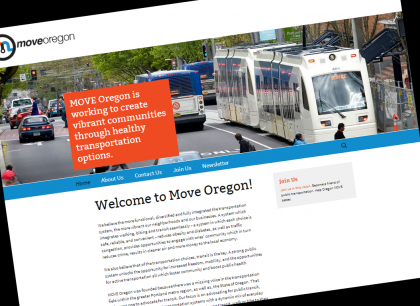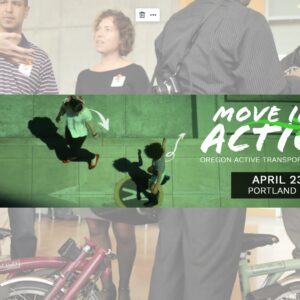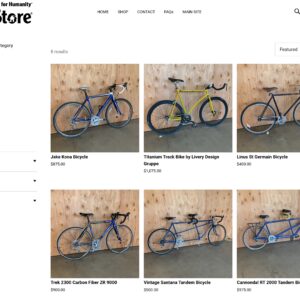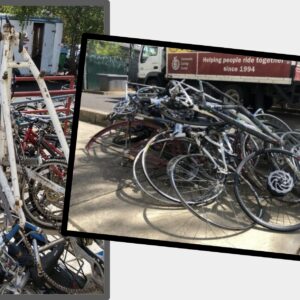
A team of heavy hitters from Portland’s private, public and nonprofit sectors has teamed up to create what looks like Oregon’s most important new transportation nonprofit in years.
It’s setting out to be, in a sense, public transportation’s answer to the Bicycle Transportation Alliance or to AAA Oregon.
In the five months since BikePortland reported on the group’s formation, Move Oregon — that’s its new name — has recruited a bike-friendly director and an impressive board that includes BTA Executive Director Rob Sadowsky, BTA-director-turned-planning-consultant Catherine Ciarlo, Portland Streetcar Executive Director Rick Gustafson and Portland Business Alliance Vice President Bernie Bottomly.
“The Portland metro region is supposed to realize quite a large population influx,” said Move Oregon Director Katja Dillmann, a former transportation policy director for Mayor Sam Adams who also serves on the board of Oregon Walks. “Everyone in the business community that I’m interacting with understands that there is no way we’re going to build enough roads to accommodate that. Nor would we want to.”
That’s why the group’s focus, it says on its new website, will be to provide a “missing voice” for better public transportation in the Portland area and around the state. It’s describing that work as part of “a system which integrates walking, biking and transit seamlessly – a system in which each choice is safe, reliable, and convenient.”
To that end, Dillmann said, the group’s organizers have agreed never to support a political horse-trade that would increase transit funding at the expense of an ally.
“Should we ever been in that hard place where it’s transit versus biking or transit versus walking, we would never sell ourselves down the river,” she said.
“Movements don’t do well when we’re picking each other apart,” Sadowsky said in a phone interview Tuesday. “Movements don’t do well when we say, ‘Fund this but don’t fund that.'”
Sadowsky said he thinks Move Oregon can be a voice that can join with the BTA to make the case for new revenue at both the state and local levels that could pay to improve transit and bike infrastructure.
“It has to be a coalition” leading the charge for such proposals, Sadowsky said. “If it’s not a partnership, it’s not going to pass.”
Move Oregon’s first two priorities, Dillmann said, will be to oppose an anti-transit ballot issue in Tigard this spring and to push for some sort of new revenue stream during Oregon’s 2015 legislative session that could be used for public transit operations.
As we wrote in July, Move Oregon is the brainchild of David Knowles, a longtime public- and private-sector executive in Portland inspired by the Seattle-based Transportation Choices Coalition.

leaders of the BTA, both sit on the board of
a new group that in some ways wants
to be the BTA of public transportation.
(Photo by J.Maus/BikePortland)
What makes this nonprofit advocacy group unusual (for the Portland area, at least) is that it’s being founded with close ties to local business advocates. The group’s official address, at least for the moment, is the office of the Portland Business Alliance, our regional chamber of commerce — and a group that regularly (though not always) disagrees with transportation advocates about whether street space is best dedicated to walking, driving, biking or parking.
That’s why it’s heartening to see the organization talking about an integrated low-car transportation system — and presumably writing some checks to support it.
It’ll be interesting to see how Move Oregon carves out a different identity from OPAL Environmental Justice Oregon, the environmental justice nonprofit that advocates for “transit-dependent” Portlanders, often by challenging TriMet over internal priorities such as light rail construction. (OPAL, meanwhile, seems to be close to a significant victory: an extension of transfer times from two hours to 2.5 hours.)
Sadowsky said he, Chris Rall and former Oregon Walks Director Steph Routh had urged the new organization to more closely involve OPAL as a collaborator, with some success. It’s an example, he said, of how the group is continuing to shape its own identity and direction.
“I don’t think Move Oregon sees itself as saying, ‘We’re the group that thinks light rail has to be the best way,'” Sadowsky said. “Move Oregon can’t be about what TriMet feels or OPAL feels. Move Oregon has to be seen as its own independent organization. That’s what takes time.”
Other big questions for this group will be its positions on two issues that divide local transit advocates: whether TriMet should be deeply cutting the health benefits of its union retirees, and whether it’s worth endorsing major road projects such as the Columbia River Crossing if they also include substantial transit and biking improvements.
Dillmann said Move Oregon hasn’t yet been able to shape its position on either of those issues, though she said “there is an awareness that there will be highway money involved” in any state transportation package in 2015.
We’re encouraged by the language this group is using so far, and eager to see how its words will translate into action.







Thanks for reading.
BikePortland has served this community with independent community journalism since 2005. We rely on subscriptions from readers like you to survive. Your financial support is vital in keeping this valuable resource alive and well.
Please subscribe today to strengthen and expand our work.
Good to see some BTA connections. Funding is always an issue, and I’m hoping that these groups don’t have to go after the same funding but instead work towards enlarging the pot for transit, bicycling, and pedestrian projects. Another voice should help when it comes to fighting the freight & automotive interests.
I have both hope and skepticism for this group. Hope because this city desperately needs another voice for good transit and low-car life. Skepticism mostly because I fear they will be co-opted by the business community to advocate for high-cost transit projects and as a fig leaf for private motor vehicle priorities rather than the strong advocacy that the area really needs.
The fact that they are meeting/mailing in the Portland Business Alliance offices is cause for concern for me. I’d love for others to give counterexamples, but in every case I recall where the Portland area was choosing between private motor vehicle speed and convenience and other community priorities, the Portland Business Alliance chose private motor vehicle speed and convenience. I hope they are turning over a new leaf, but I’m waiting for more information!
(1) Yep. The PBA? Really?
(2) “Movements don’t do well when we say, ‘Fund this but don’t fund that.'”
That part I didn’t understand. In light of where we stand (ODOT’s worldview, a century of overwhelming prioritization of cars) how could one hope to make any progress on any of these fronts without calling a spade a spade? Haven’t we learned that in those cities and countries where all the things bikeportland, its audiences, and ostensibly this new organization would like to pursue succeed, do so because the perks, prioritization, & privileges hitherto reserved for those who drive are revoked or inverted?
I realize the quote was about transit, bicycling, and walking, but when are we going to start being bold? The last time I remember the PBA weighing in on downtown infrastructure, they offered up language that to me looked awfully wishy-washy. They called them ‘multi-modal safety improvements.’
http://bikeportland.org/2013/02/28/city-reveals-plans-for-6-million-downtown-multimodal-safety-improvements-83552#comment-3801521
(3) “Move Oregon can’t be about what TriMet feels or OPAL feels. Move Oregon has to be seen as its own independent organization.”
Why?
Do we really need *another* organization? With significant overlap to existing organizations that already do good work? Is that really the missing ingredient here? The most pressing need?
I think that if this organization does its job rather than the bidding of the “business community,” it could work with OPAL in a “good cop/bad cop” way. OPAL could be the “radical activists” who make the big demands and ask for the long-term vision, and Move Oregon could be the “reasonable activists” who hammer out an acceptable compromise that moves us considerably in the right direction. If OPAL can move the window of what’s a reasonable option in the right direction by making big asks, Move Oregon’s “compromise” could be darn good compared to the status quo.
But on the other hand, if they advocate exclusively for additional high-cost capital projects at the expense of frequency and service on existing rail and bus lines, Move Oregon will not help the situation at all. Especially if they come out in favor of the CRC, which will use up a huge portion of our transportation funds for a not-so-good project.
The fact that they’re telegraphing acquiescence to the CRC (Dillmann’s “there is an awareness that there will be highway money involved” in any 2015 transportation funding bill – how could there not be road funding?) is not a good omen in my opinion.
Quick note on this: I realized that the way I was writing that last bit about highways in 2015, Dillmann’s statement could have been read as a coded message about the CRC. Based on the exchange, I definitely don’t think that’s what she was saying all; I take it at face value that she was talking about highway money in general, of which there is much that could be spent outside the Portland area.
Ha, thanks Michael. I should know better than to think I have found coded statements early in the morning when my brain isn’t working quite right yet.
CRC should be their first prority, if they build that bridge there will be no money for anything else. The group might as well dissolve and go back to their corners and dream about what could have been.
At the very least, they should advocate for a phased approach that prioritizes transit like the CSA.
Good to see additional advocacy for active transportation.
It should be easy to get plenty of corporate $ to fund a transit-oriented advocacy group. There’s huge profits to be made by private industry to increase transit investment. Whenever TriMet buys buses, they’re committing a huge batch of funds to the manufacture of the bus, and making a long term committement to purchase replacement parts for the life of the vehicle. Its in the best interest of the bus manufacturers to make regular donations to local groups advocating for better transit.
The same goes for all the bus service accessories, like schedule consultants, on-time status video monitors, advertising agencies, transit stop manufacturers, maintenance facility providers, civil engineers for transit hub design, etc.
Even more so for fixed guideway systems — selling rails, overhead power equipment, transformers, light rail station materials, escalators and elevators, etc.
All in all, I’m sure it costs $2 or $3 to provide each trip on TriMet, and about 10% of that is probably going into the profit coffers of all the industries that support the system, and each and every one of them has an incentive to donate part of this, like maybe 5% or their profit, or 10%, into the pots of organizations that lobby for increased transit.
Bikes have none of these things going for them. It costs maybe $0.10 per trip, counting purchase of the vehicle, maintenance, clothing costs and a little food? Very little corporate profit there to feed back into advocacy. Fortunately, because of routine brushes with death mixed with extreme pleasure, bicyclists get pretty feisty and tend to do well organizing advocacy groups with minimal financial support.
Good luck, Move Oregon! Looking forward to seeing what you folks can do.
Ted Buehler
The business interest in good transit goes well beyond those directly benefiting from the construction. There’s quite a bit of evidence showing good transit broadly boosts the local economy, and can have a fairly dramatic effect in development along transit lines. That’s the reason that groups like the PBA support it fairly broadly.
I think the same is true of bicycling as well. There’s a growing amount of data on how it helps boost the economy. I think we’re likely to see more and more business interests start supporting bicycling more vocally in the near future as it becomes more widely accepted fact.
One issue though is there’s not as much single focus lobbying for specific bike projects as there is for transit and highways projects since there isn’t that big pot of capital money available for them. Making more federal money available for bike projects would help a lot for that.
“”Should we ever been in that hard place where it’s transit versus biking or transit versus walking, we would never sell ourselves down the river,” she said.”
I hope that this includes a commitment to 100% mitigation of all negative impacts to bicycle infrastructure in future streetcar extensions.
Ted Buehler
I have to admit, when i read this article my first thought was “this group needs to figure out a way to make streetcar tracks safe for bicyclists”. If they cant do that, then bike groups and streetcar groups will forever be at war, fighting for turf.
As Cap’n Transit has pointed out innumerable times on his blog, any spending on highways draws users away from parallel mass transit routes. Advocates for transit who condone highway spending are shooting themselves in the foot.
I’m taking a wait-and-see attitude.
And there is ONE thing I’m waiting to see: will they support, or will they oppose, the CRC? That’s the real test for this group.
If they support a boondoggle that drains billions away from worthier transportation projects, just because of the included rail and bike-path amenities, then they’ll prove to have been just a greenwashing front for the agenda of the PBA, labor unions and other powerful entrenched interests (“See? Even Move Oregon supports it!”)
If, on the other hand, they have the ‘nads to stand up to the political establishment and oppose the CRC, they’ll have my undying support.
Right! MO needs to have Joe Cortright and Jim Howell on their board and needs to endorse a lower cost, data driven version of the CRC to be real advocates. Having the PBA makes that pretty iffy.